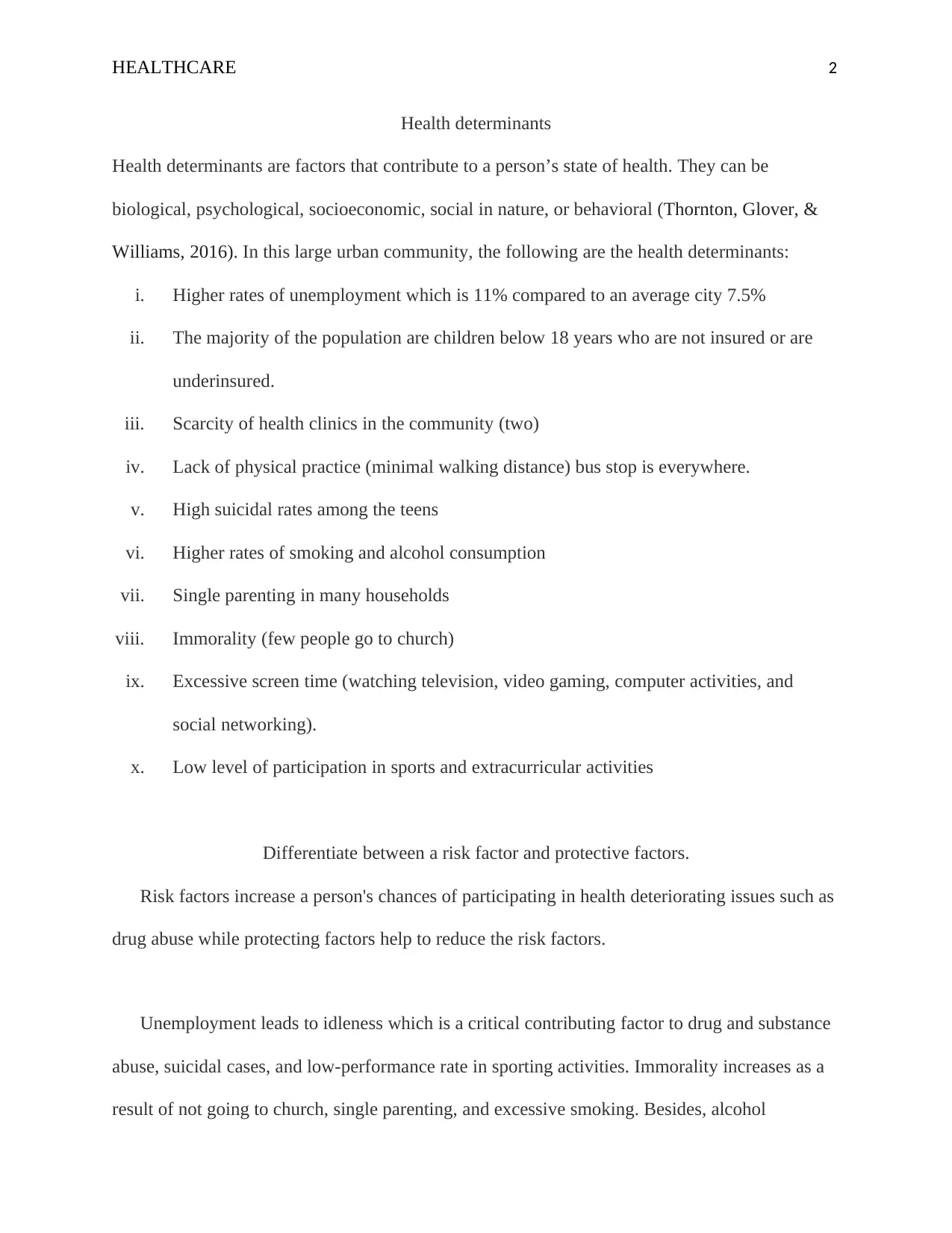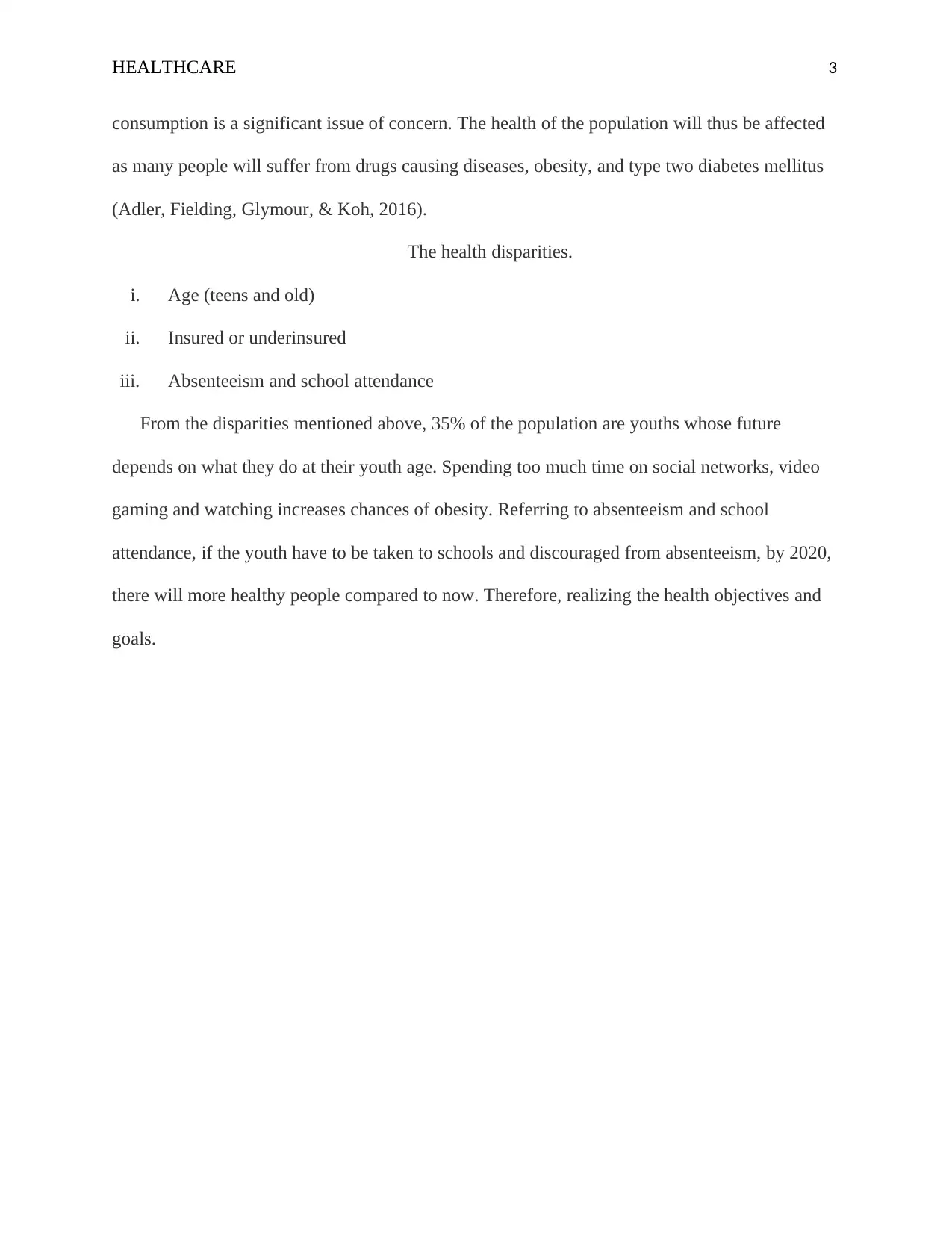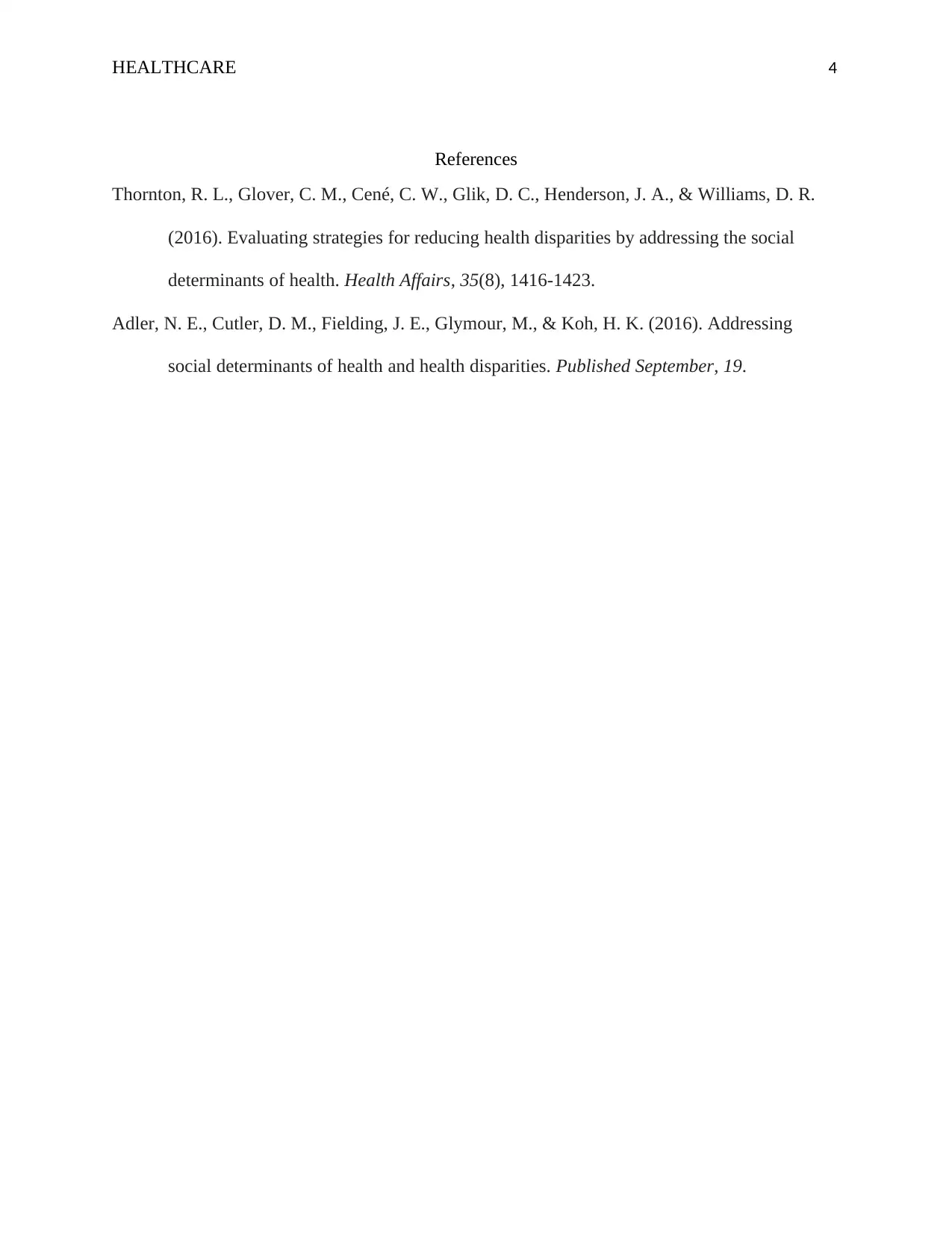Assignment on Analysis about Healthcare
VerifiedAdded on 2022/10/06
|4
|514
|12
Assignment
AI Summary
Contribute Materials
Your contribution can guide someone’s learning journey. Share your
documents today.

Running Head: HEALTHCARE 1
Healthcare
Student’s Name
Institution Affiliate
Date
Healthcare
Student’s Name
Institution Affiliate
Date
Secure Best Marks with AI Grader
Need help grading? Try our AI Grader for instant feedback on your assignments.

HEALTHCARE 2
Health determinants
Health determinants are factors that contribute to a person’s state of health. They can be
biological, psychological, socioeconomic, social in nature, or behavioral (Thornton, Glover, &
Williams, 2016). In this large urban community, the following are the health determinants:
i. Higher rates of unemployment which is 11% compared to an average city 7.5%
ii. The majority of the population are children below 18 years who are not insured or are
underinsured.
iii. Scarcity of health clinics in the community (two)
iv. Lack of physical practice (minimal walking distance) bus stop is everywhere.
v. High suicidal rates among the teens
vi. Higher rates of smoking and alcohol consumption
vii. Single parenting in many households
viii. Immorality (few people go to church)
ix. Excessive screen time (watching television, video gaming, computer activities, and
social networking).
x. Low level of participation in sports and extracurricular activities
Differentiate between a risk factor and protective factors.
Risk factors increase a person's chances of participating in health deteriorating issues such as
drug abuse while protecting factors help to reduce the risk factors.
Unemployment leads to idleness which is a critical contributing factor to drug and substance
abuse, suicidal cases, and low-performance rate in sporting activities. Immorality increases as a
result of not going to church, single parenting, and excessive smoking. Besides, alcohol
Health determinants
Health determinants are factors that contribute to a person’s state of health. They can be
biological, psychological, socioeconomic, social in nature, or behavioral (Thornton, Glover, &
Williams, 2016). In this large urban community, the following are the health determinants:
i. Higher rates of unemployment which is 11% compared to an average city 7.5%
ii. The majority of the population are children below 18 years who are not insured or are
underinsured.
iii. Scarcity of health clinics in the community (two)
iv. Lack of physical practice (minimal walking distance) bus stop is everywhere.
v. High suicidal rates among the teens
vi. Higher rates of smoking and alcohol consumption
vii. Single parenting in many households
viii. Immorality (few people go to church)
ix. Excessive screen time (watching television, video gaming, computer activities, and
social networking).
x. Low level of participation in sports and extracurricular activities
Differentiate between a risk factor and protective factors.
Risk factors increase a person's chances of participating in health deteriorating issues such as
drug abuse while protecting factors help to reduce the risk factors.
Unemployment leads to idleness which is a critical contributing factor to drug and substance
abuse, suicidal cases, and low-performance rate in sporting activities. Immorality increases as a
result of not going to church, single parenting, and excessive smoking. Besides, alcohol

HEALTHCARE 3
consumption is a significant issue of concern. The health of the population will thus be affected
as many people will suffer from drugs causing diseases, obesity, and type two diabetes mellitus
(Adler, Fielding, Glymour, & Koh, 2016).
The health disparities.
i. Age (teens and old)
ii. Insured or underinsured
iii. Absenteeism and school attendance
From the disparities mentioned above, 35% of the population are youths whose future
depends on what they do at their youth age. Spending too much time on social networks, video
gaming and watching increases chances of obesity. Referring to absenteeism and school
attendance, if the youth have to be taken to schools and discouraged from absenteeism, by 2020,
there will more healthy people compared to now. Therefore, realizing the health objectives and
goals.
consumption is a significant issue of concern. The health of the population will thus be affected
as many people will suffer from drugs causing diseases, obesity, and type two diabetes mellitus
(Adler, Fielding, Glymour, & Koh, 2016).
The health disparities.
i. Age (teens and old)
ii. Insured or underinsured
iii. Absenteeism and school attendance
From the disparities mentioned above, 35% of the population are youths whose future
depends on what they do at their youth age. Spending too much time on social networks, video
gaming and watching increases chances of obesity. Referring to absenteeism and school
attendance, if the youth have to be taken to schools and discouraged from absenteeism, by 2020,
there will more healthy people compared to now. Therefore, realizing the health objectives and
goals.

HEALTHCARE 4
References
Thornton, R. L., Glover, C. M., Cené, C. W., Glik, D. C., Henderson, J. A., & Williams, D. R.
(2016). Evaluating strategies for reducing health disparities by addressing the social
determinants of health. Health Affairs, 35(8), 1416-1423.
Adler, N. E., Cutler, D. M., Fielding, J. E., Glymour, M., & Koh, H. K. (2016). Addressing
social determinants of health and health disparities. Published September, 19.
References
Thornton, R. L., Glover, C. M., Cené, C. W., Glik, D. C., Henderson, J. A., & Williams, D. R.
(2016). Evaluating strategies for reducing health disparities by addressing the social
determinants of health. Health Affairs, 35(8), 1416-1423.
Adler, N. E., Cutler, D. M., Fielding, J. E., Glymour, M., & Koh, H. K. (2016). Addressing
social determinants of health and health disparities. Published September, 19.
1 out of 4
Your All-in-One AI-Powered Toolkit for Academic Success.
+13062052269
info@desklib.com
Available 24*7 on WhatsApp / Email
![[object Object]](/_next/static/media/star-bottom.7253800d.svg)
Unlock your academic potential
© 2024 | Zucol Services PVT LTD | All rights reserved.

